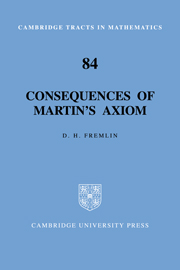Appendix A - Useful facts
Published online by Cambridge University Press: 07 October 2011
Summary
In this appendix I write out the definitions and theorems which I use in the pages above, and for which no natural place presented itself in the main line of the exposition. In general I give proofs only when I have been unable to find satisfactory references in hard covers. I hope that the index will prove adequate and that there will be no need for you to read systematically through this appendix; but perhaps a preliminary glance at §A1 will be useful. Some of the material which you might look for here is in §12.
Notation
Here I list some of the special symbols I use, and indicate the ways in which I think of some of the fundamental concepts of set theory. I have tried to express these in terms which are readily translatable into the formulae of any conventional description of Zermelo–Fraenkel set theory, though it will be clear that this particular framework is not the only possible one. Note that I use the axiom of choice without scruple and without comment.
Reserved symbols
(a) N, Z, Q, R represent respectively the sets of non-negative integers, integers, rational numbers and real numbers.
(b) ω is the first infinite ordinal. ω1 is the first uncountable ordinal. c = 2ω = #(R), the cardinal of the continuum, κ and λ always stand for cardinals, m, mK and p stand for the special cardinals defined in §11.
[…]
- Type
- Chapter
- Information
- Consequences of Martin's Axiom , pp. 232 - 287Publisher: Cambridge University PressPrint publication year: 1984



